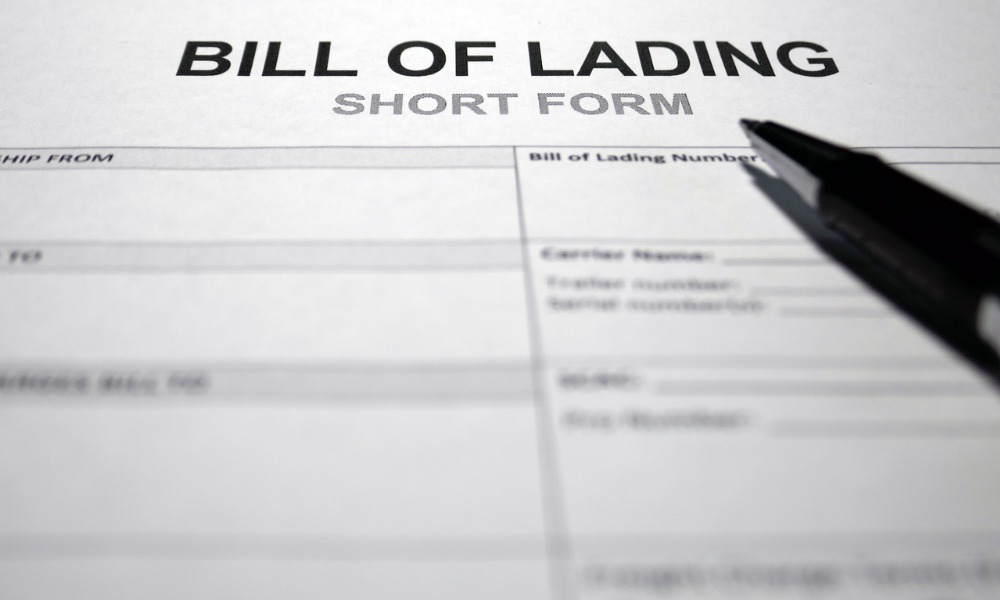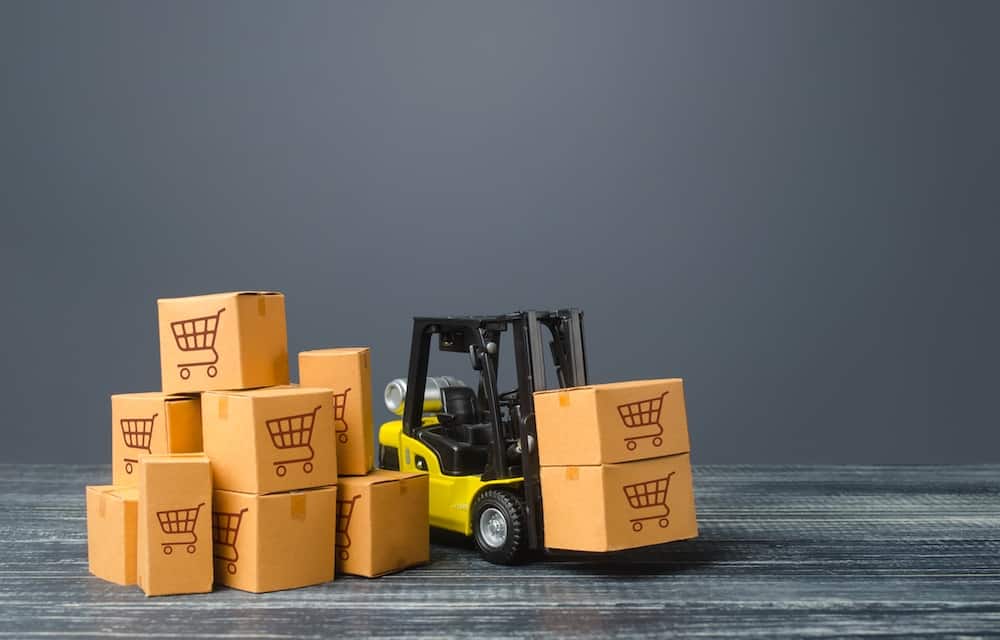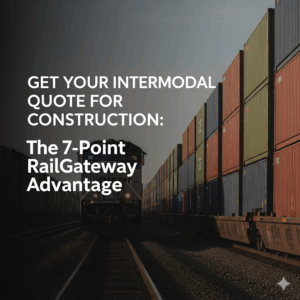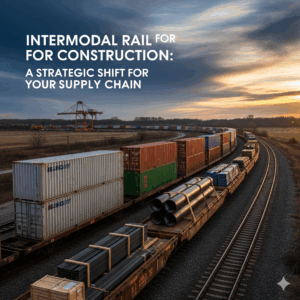Bon voyage!
If you’re shipping freight across Canada, into the U.S., or overseas in 2025, it’s no longer enough to just book and track. To stay competitive and protect your bottom line, you need to speak the language of logistics—and that starts with understanding the most essential shipping terms used in today’s global freight industry.
From incoterms and container codes to documentation and customs lingo, every shipping term carries weight. Misunderstanding even one can cost you time, money, or even legal trouble. That’s why this 2025 shipping glossary is designed to give you a solid, up-to-date foundation on the terminology that drives the shipping world.
Whether you’re new to freight or a seasoned logistics manager brushing up on definitions, this keyword-rich, plain-English guide will decode the 17 most critical shipping terms you need to know—so you can ship smarter, negotiate better, and avoid costly confusion.
Let’s dive in.
Why Every Business Needs to Know These Shipping Terms in 2025
In 2025, shipping is faster, more complex, and more digitized than ever. With the rise of e-commerce, intermodal freight, and cross-border trade, there’s a growing reliance on accurate documentation, precise labeling, and integrated systems. That means that knowing the correct shipping term for each part of your logistics process is essential to avoiding delays, penalties, or miscommunication with carriers, brokers, or customs authorities.
Whether you’re arranging LTL (less-than-truckload), FTL (full truckload), or intermodal rail shipping in Canada, using the right shipping term ensures clarity in contracts, reduces risk, and increases supply chain efficiency.
The High Cost of Misunderstanding a Shipping Term
Before we get into the glossary, it’s worth understanding the risks of not knowing or misusing shipping terminology:
- Inaccurate documents can delay customs clearance
- Misquoted incoterms can lead to liability disputes
- Incorrect freight classifications can trigger surcharges
- Unclear packaging labels can result in damaged goods or refused delivery
- Improper declarations can violate government or port regulations
Learning the right shipping term isn’t just about sounding professional—it’s about protecting your freight, your budget, and your customer relationships.
Shipping Terms are the Foundation of Global Logistics
In the interconnected world of 2025 freight, every stage of the shipping journey—pickup, handling, customs, loading, transit, delivery—relies on shared definitions and industry-standard terminology. When you’re working with 3PLs, customs brokers, freight forwarders, and ocean carriers, a shared understanding of each shipping term eliminates missteps.
Standardized shipping terms like FOB (Free on Board), CIF (Cost, Insurance, and Freight), BOL (Bill of Lading), and HS Codes (Harmonized System) are all used to:
- Define who pays for what
- Assign responsibilities for risk and insurance
- Govern how cargo is packed, labeled, and moved
- Set expectations for timelines and handoffs
In short, knowing the right shipping term makes you a better shipper and a more informed business partner.
How This Glossary Helps You Ship Smarter in 2025
This isn’t just a basic vocabulary list. Each shipping term included in our 2025 glossary was handpicked based on its relevance to modern Canadian freight, including:
- Cross-border shipments between Canada and the U.S.
- Ocean freight imports and exports
- Intermodal rail shipping and containerized cargo
- Truckload and LTL carrier operations
- Customs and compliance procedures
- Warehouse and inventory handoff points
Our goal? To give you real-world understanding of how each shipping term applies in today’s freight environment.
This knowledge is especially important for:
- Small business owners handling their own logistics
- Shipping coordinators managing daily operations
- Procurement and supply chain managers seeking cost savings
- E-commerce businesses scaling their fulfillment processes
- Freight partners and brokers who communicate across borders
By mastering this glossary of essential shipping terms, you’ll be able to confidently read shipping documents, negotiate with vendors, interpret customs forms, and avoid the costly guesswork that comes from jargon confusion.
Canadian Shipping Context: Why Terminology Matters More Here
In the Canadian freight environment, the language of logistics comes with unique nuances. Many shippers are managing multimodal freight, combining rail transportation, truckload services, and cross-border customs on a single bill of lading.
Even a basic misunderstanding—say, confusing “DDP” (Delivered Duty Paid) with “DAP” (Delivered at Place)—can lead to import holds, extra duty charges, or shipment rejection.
And because Canada’s transportation sector relies heavily on intermodal rail shipping, clear communication across rail yards, trucking hubs, and ports is essential. From container types to shipping documents to customs classifications, knowing each shipping term means fewer interruptions and fewer compliance headaches.
Automation and AI in Shipping Mean You Still Need Human Fluency
2025 is a year where AI-driven shipping platforms are everywhere. Digital freight marketplaces, predictive route planners, and automated customs forms are streamlining operations. But here’s the catch: those tools still depend on accurate inputs. The systems you use are only as smart as your understanding of the shipping terms they require.
That means you still need to:
- Recognize what each field or label on a form is asking for
- Interpret customs status messages and carrier updates
- Communicate clearly with human stakeholders across the supply chain
And you need to do so in the correct language of freight—starting with a working knowledge of every essential shipping term in this guide.
You’ll Save Time, Money, and Reputation
Still not convinced this glossary is worth your time?
Here’s what mastering these shipping terms will do for your business:
- Reduce freight miscommunications that cause costly rejections or rebookings
- Avoid unnecessary surcharges tied to wrong packaging, handling, or contract terms
- Streamline customs clearance by filling out compliant, accurate documents
- Negotiate better rates because you’ll understand pricing structures and incoterm implications
- Protect your goods by assigning responsibility correctly at each leg of the journey
In today’s competitive shipping world, efficiency isn’t just about faster transit—it’s about fewer mistakes, better coordination, and proactive freight management.
What’s Next: Your 2025 Glossary of Must-Know Shipping Terms
Now that you understand why knowing the correct shipping term is mission-critical for successful freight operations in 2025, let’s get into the glossary.
In the next section, we’ll break down the 17 most essential shipping terms – with clear definitions, real-world examples, and insider tips on how to apply each one to your shipping operations.
Whether it’s understanding what a BOL really is, how CIF affects your cargo insurance, or what Incoterms actually govern in a cross-border trade agreement, this guide will decode each shipping term so you can ship with confidence.

Key Shipping Terms in International Trade
Freight Forwarder
A freight forwarder is a shipping term that describes a company that specializes in managing the transportation of goods from one location to another. They serve as intermediaries between the shipper and carrier, arranging the logistics of getting the goods from the point of origin to their final destination.
Freight forwarders handle all aspects of the shipping process, including:
- Documentation
- Customs brokerage and clearance
- Warehousing (if necessary)
- Negotiating freight rates
- Booking cargo space
- Tracking shipments
- Providing insurance options
- Consolidating smaller shipments into larger ones for cost efficiency
Container Load
Container load is a shipping term that determines the maximum capacity of goods accommodated within a standard shipping container.
The two most prevalent container sizes, 20 feet (TEU) and 40 feet (FEU), have become industry standards for streamlining logistics and enabling efficient stacking and transportation on various modes like ships, trains, and trucks.
There are two main types of container loads:
- Full Container Load (FCL): When a shipper’s goods fill an entire container.
- Less than Container Load (LCL): When multiple shippers’ goods are consolidated into a single container.
International Commercial Terms (Incoterms)
Incoterms is a shipping term that outlines rules that define the obligations of buyers and sellers in international trade. They provide a standardized framework for determining the transport costs, risks, and delivery terms of goods during shipment.
Incoterms help clarify the division of responsibilities between parties involved in a transaction, such as who is responsible for arranging transportation, insurance, customs clearance, and delivery for goods shipped.
These shipping terms are regularly updated by the International Chamber of Commerce (ICC) to reflect changes in global trade practices.
Some common Incoterms include:
- EXW (Ex Works)
- FOB (Free on Board)
- CIF (Cost, Insurance, and Freight)
- DDP (Delivered Duty Paid)
Understanding these shipping terms is crucial for determining responsibilities and costs in international trade transactions.
Freight Shipping
This is one of the shipping terms that reflects the lifeline for businesses. Freight shipping connects goods to customers across land, sea, and air. It’s the backbone of global trade with myriad services like freight forwarding, customs clearance, and tracking.
Whether speedy air freight or cost-effective sea shipping, freight providers ensure seamless logistics and supply chain mastery.
Supply Chain
The supply chain is a dynamic web connecting goods from origin to consumption. It encompasses:
- Sourcing
- Procurement
- Transportation costs
- Warehousing
- Delivery
Suppliers, manufacturers, distributors, and customers unite to ensure efficient and timely deliveries.
International Trade
Through international trade in shipping, countries can access a wide range of products and services that may not be available domestically. It allows for more excellent consumer choices and promotes economic growth.
International shipping allows countries to export goods and expand their markets, stimulating their economies.
Freight Costs
Freight charges, or shipping costs, are shipping terms that represent the payment made to a carrier company for transporting products from their origin to a mutually agreed destination.
Multiple factors influence the shape of shipping costs in shipping, such as:
- Distance; longer routes entail higher fuel consumption and resources.
- Cargo type and weight matter, too; a full container load raises costs.
- Modes of transportation. Planes cost more than boats or trucks.
- Market conditions
- Fuel prices
- Regulations
Bill of Lading
Of the many shipping terms, a bill of lading (BOL) is one you will hear often. It is a legal document issued by the carrier. It serves as evidence of the contract of carriage between the shipper, transportation, and consignee.
The bill of lading includes all the necessary information related to the shipment, such as:
- The names and addresses of the shipper and consignee
- Description of the goods
- Quantity, weight
- Special handling instructions for a container loaded.
It also contains the terms and conditions of the contract, including liability and delivery instructions. It acts as a receipt, acknowledging that the carrier has taken possession of the goods.

Container Yard and Container Freight Station
In the shipping world, a container yard is a bustling hub where containers await their global journeys, strategically stored before loading onto ships or trucks.
On the other hand, a container freight station buzzes with activity as cargo is skillfully loaded into or unloaded from these sturdy steel giants.
These essential facilities ensure smooth logistics operations, optimizing the flow of goods and keeping the global supply chain in motion.
Freight Broker
A freight broker connects shippers with carriers. They act as intermediaries, arranging the transportation of goods from the shipper to the page.
By utilizing their extensive network of reliable carriers, freight brokers ensure that goods are delivered safely and efficiently. They handle various responsibilities, including:
- Negotiating shipping rates
- Coordinating pickups and deliveries
- Tracking shipments
- Handle all the necessary paperwork, such as Bills of Lading and shipping invoices
Shippers can focus on their core business while leaving the logistics to the experts.
Ocean Freight Forwarder
An ocean freight forwarder is a company that helps facilitate the transportation of goods via sea freight. They act as an intermediary between shippers and carriers, coordinating smooth and efficient cargo movement. Ocean freight forwarders offer a range of services, including:
- Arranging for the pickup
- Packaging
- Documentation of goods, as well as negotiating rates with shipping lines and customs clearance.
- They assist in tracking shipments
- Managing any necessary paperwork or documentation.
Ocean freight forwarders have expert knowledge of the logistics and regulations of shipping goods across different countries and continents.
Less Than Container Load (LCL)
LCL is one of the shipping terms that refers to a mode of transporting goods where the cargo does not fill a standard shipping container. Instead, multiple shipments from different customers are combined to fill a container, thus reducing costs for each shipment.
LCL is a cost-effective option for businesses shipping smaller quantities of goods, allowing them to share the shipping cost with other companies.
In LCL shipping, the goods are consolidated at a warehouse or container freight station before being loaded onto a container for transportation. LCL involves careful sorting and packaging to ensure the safety and integrity of each shipment.
Free on Board (FOB) and Delivered Duty Paid (DDP)
FOB and DDP are shipping terms like seasoned dance partners when shipping, gracefully dictating the moment of ownership and risk transition.
FOB’s spotlight shines on the seller, who leads until the goods sway onto the vessel. At the same time, DDP’s allure places the seller at the center of responsibility for delivering goods right to the buyer’s doorstep, expertly maneuvering through customs.
Air Freight
Air freight is the transportation of goods via aircraft. The main advantage of air freight is speed, as goods can be delivered to their destination in a matter of hours or days, depending on the distance. It benefits time-sensitive shipments that must be transported over long distances.
Free Trade Zone
A free trade zone is where goods can be imported, exported, and stored without being subject to specific trade barriers, such as customs duties or taxes. This concept encourages international trade and facilitates the movement of goods across different countries.
Companies operating within these zones can benefit from the following:
- Streamlined customs procedures
- Reduced costs
- Improved logistics, thus enhancing their competitiveness in the global market.
A free trade zone in shipping encourages collaboration among nations, as it fosters open trade and cooperation.
Customs Clearance
Customs clearance are procedures and documentation required to allow goods to enter or leave a country. During customs clearance, the customs authority verifies that the shipped goods comply with all applicable laws and regulations.
The process involves several steps, including:
- Submitting the necessary documents, such as invoices, packing lists, and customs declaration forms for international transactions.
- The shipping documents will get reviewed by customs authorities to ensure the goods are correctly classified and valued for customs purposes.
- The customs authorities can also conduct physical inspections or x-ray scans to confirm the accuracy of the delivery service.
Customs Broker
A customs broker is a licensed professional who specializes in helping importers and exporters navigate the complex world of customs regulations and procedures. They act as intermediaries between international traders and government customs agencies.
Key responsibilities of customs brokers include:
- Preparing and submitting customs documentation
- Calculating and paying duties and taxes on behalf of clients
- Ensuring compliance with import/export laws and regulations
- Advising clients on trade regulations and requirements
- Facilitating communication between traders and customs officials
Working with a customs broker can help streamline the import/export process, reduce delays, and ensure compliance with all relevant laws and regulations.
Final Thoughts: Why Knowing the Right Shipping Terms Empowers Smart Shippers in 2025
Understanding each shipping term outlined in this glossary isn’t just about expanding your vocabulary—it’s a powerful, strategic move that can dramatically improve your logistics performance, reduce costly errors, and strengthen your role in your company’s supply chain success.
In the fast-paced, tech-enhanced shipping environment of 2025, clarity is everything. And clear communication begins with using the right shipping term at the right time.
Whether you’re coordinating full container loads, less-than-truckload freight, or navigating complex international shipments, fluency in modern shipping terminology gives you a competitive edge. You’ll be better equipped to handle documentation, communicate with customs, negotiate with carriers, and manage unexpected issues with speed and professionalism.
From Confusion to Control: Mastering the Language of Logistics
Misunderstanding even a single shipping term can lead to:
- Delayed shipments
- Lost or misrouted freight
- Extra fees and penalties
- Legal and compliance issues
- Damaged relationships with vendors, carriers, and customers
But once you understand the terminology, you take back control of your freight. You’ll know what’s expected, where responsibilities lie, what costs are included, and which documents are necessary to move goods efficiently.
Mastering this language turns shipping into a tool—not a risk.
Benefits of Understanding Shipping Terms for Different Roles
No matter your position, knowing your shipping terms makes you more effective:
- Business Owners: Negotiate smarter contracts, reduce freight spend, and make more informed logistics decisions.
- Procurement Teams: Accurately compare quotes, evaluate supplier performance, and control landed cost.
- Shipping Coordinators: Complete documents faster, reduce delays, and resolve carrier issues efficiently.
- Customs Brokers: Ensure faster clearance and avoid regulatory fines by using the correct classifications.
- Freight Forwarders: Provide better service, improve trust, and simplify complex global shipping for clients.
Avoid These Common Mistakes by Knowing the Right Shipping Terms
Some of the most costly mistakes in logistics come from confusion around shipping terms. Here are a few you can now avoid:
- Assuming CIF and FOB are interchangeable—they shift risk and cost at different stages.
- Misclassifying your freight—leading to reweighs, reclassifications, or rejected pickups.
- Not providing a proper Commercial Invoice or HS Code—causing customs seizures or rejections.
- Ignoring container specs—leading to damaged freight or inefficient use of space.
Knowing the terminology arms you with the knowledge to ask the right questions and avoid preventable disruptions.
A Final Note: Shipping Terms = Business Confidence
In 2025, shipping isn’t just a backend task. It’s a driver of customer satisfaction, operational efficiency, and profitability. That means the more you understand about your freight, the better positioned you are to succeed—and the shipping term glossary you now know is a critical part of that equation.
Every interaction you have with a carrier, warehouse, customs officer, or shipping partner is built on shared language. With the correct terms, you’ll be faster, clearer, and more effective in every step of the process.
How RailGateway Can Help You Navigate Every Shipping Term With Confidence
At RailGateway, we don’t just move freight—we help Canadian businesses move smarter. We understand that many of our clients aren’t shipping experts. That’s why we go beyond rates and routes to offer real, hands-on support, including clear explanations of every shipping term and process step.
As a Canadian leader in intermodal rail shipping, we handle:
- Full container load (FCL) and less-than-container load (LCL) freight
- Seamless integration between rail and truck modes
- Container booking and equipment selection
- Freight classification and documentation
- Cross-border rail and customs support
- Real-time shipment tracking and proactive communication
We’re here to make every shipping term understandable—so your shipments arrive on time, on budget, and without stress.
Our bilingual logistics experts are ready to help you decode contracts, manage your shipping documentation, and ensure every handoff in your freight journey is clear and efficient. You’ll never have to guess what “FOB Origin” or “Delivered Duty Paid” means again.
Ready to Ship Smarter in 2025?
If you’re looking to ship across Canada or into the U.S., and want a reliable logistics partner who speaks your language—including every shipping term—we’re ready to help.
📦 Visit RailGateway.ca to request a quote, explore intermodal solutions, or speak with a freight specialist who can walk you through every shipping term, container type, and documentation step.
Because smart shipping starts with clear communication—and RailGateway makes that easy, efficient, and cost-effective.

Additional Resources
Government of Canada – Transportation Glossary https://tc.canada.ca/en/services/transportation-glossary
Incoterms® 2020 – ICC https://iccwbo.org/resources-for-business/incoterms-rules/incoterms-2020/
U.S. Customs and Border Protection – Import Glossary https://www.cbp.gov/trade/programs-administration/trade-agreements/glossary





